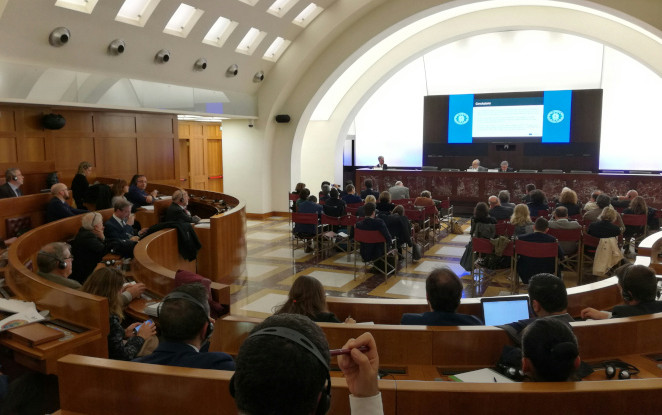Italy presents its new/updated bioeconomy strategy
On May 14, at the Presidency of the Council of Ministers’ office, the update of the National Bioeconomy Strategy was presented. According to the reviewed document, which Italy adopted in 2017, the Italian Bioeconomy is third in Europe, after the Germany and France, with an annual turnover of around 330 billion euros and 2 million jobs. Furthermore, Italy is second in Europe in terms of research and innovation and often the first in terms of wealth in biodiversity and innovative and quality products placed on the market.
The day began with the speeches of the President of the National Committee for Biosafety, Biotechnology and Life Sciences, Andrea Lenzi, the Undersecretary to the Presidency of the Council Giancarlo Giorgetti, the Minister of Education, University and Research Marco Bussetti, Mimmo Turano, Councilor for Productive Activities of the Sicilian Region, and Alessandra Stefani, General Director on behalf of the Minister of Agricultural, Food and Forestry Policies. In particular, Prof. Fabio Fava, appointed by the Presidency of the Council as technical and scientific coordinator to follow the work of updating the Strategy, illustrated the changes made to the strategic document and the future challenges for the sector.
Waldemar Kutt DGRTD, Bioeconomy Directorate, Head of Strategy Unit, and Philippe Mengal, director of BBI JU spoke about the European Bioeconomy Strategy, also recently updated, while Giovanni De Santi, Director for sustainable development of the European Commission JRC, underlined the need to help other countries to develop their own strategy, starting from the Italian model.
Giulia Gregori, General Secretary of the SPRING Cluster and Novamont Head of Institutional Communication and Strategic Planning, underlined the importance that the bio-based industry has and will increasingly have in the reindustrialization of no more competitive sites, regenerating rural areas, giving life to bio-products designed to protect water and soils and restoring value to communities, encouraging the spread of a systemic and circular culture. In particular, she pointed out how bio-based chemistry is one of the sectors in which our country is a leader in Europe with large private investments.
Also the representatives of the other National Clusters involved in the revision were present, in particular Paolo Bonaretti for the Cluster Agrifood CLAN and Emilio Fortunato Campana, for the Cluster Blue Growth BIG.
The BBI JU - BIO Based Industries Joint Undertaking info day was held on the same day. Gregori as Representative of the Bio-Based Industries Consortium, in a round table with Philippe Mengal and Elisabetta Balzi, DG Research and Innovation, European Commission, illustrated the challenges for the future of the biobased industry and the growing role that the BBI will play in the development of the bioeconomy in Europe.

